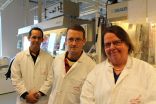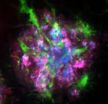(Press-News.org) More than three quarters of oncology specialists in Europe, South America and Asia believe their patients are not always well enough informed about the treatment options available to them, survey results have revealed at the ESMO 2014 Congress in Madrid, Spain.
The results come from an online survey of 895 doctors from 12 countries in Europe, South America and Asia. All were practicing oncology specialists, with more than three years' experience, treating more than fifteen patients a month.
While 82% of those surveyed believed that deciding on a course of treatment is a process that should be shared between doctors and the patient, fewer than 23% of physicians believed their patients were always fully informed, the survey showed.
"Our respondents felt that nurses were the best source of information for their patients, but only 45% thought their patients actually had access to nurse support," said Prof Fortunato Ciardiello, from the Second University of Naples, Italy, and ESMO President-Elect.
The survey, conducted in late 2013, aimed to measure how widely personalised medicine had been adopted into clinical practice around the world.
It showed that 90% of oncologists are currently using biomarker testing to help them choose which treatment to offer their patients. The most commonly used tests were for KRAS mutations (widely used in colorectal cancer), and hormone receptor status and HER2 expression (in breast cancer). Of the minority not currently performing biomarker testing, 55% identified cost or lack of reimbursement as key issues.
"Although overall we found that 73% of physicians believed their patients knew that it is possible to test tumours to help decide which treatment to give, we noted that this fell to 55% in Germany and Turkey," Ciardiello said.
The results compare interestingly to another survey reported at the ESMO 2012 Congress, when Prof Sabine Tejpar, from University Hospital of Leuven, Belgium and colleagues reported that one-third of cancer patients were unaware of the fact that it is now possible to determine who is most likely to benefit from particular treatments.
Cancer treatment is being transformed as scientists discovered the molecular changes at the heart of many cancers, but the survey suggested patients were not always aware of this revolution.
Tejpar and colleagues had surveyed 811 patients diagnosed with cancer from Argentina, China, France, Germany, Italy, Spain and the UK. Results showed that 32% (260) of those interviewed thought no tests were available to determine which cancer treatments might work in certain individuals, while 53% thought that testing might be possible.
The new results reinforce the message of that earlier study, Ciardiello said.
"Oncologists are aware of the importance of molecular testing for the selection of cancer treatment, at least in some cancers, but our results show that they feel there are still economic and organisational problems that are hindering the use of these tests."
The survey also showed that 78% of oncologists think that their patients need more information to help them understand the different types of cancer and how cancers progress.
"It is clear that while personalised (or precision) medicine is now a mainstream part of oncology around the world, more needs to be done to ensure patients are kept up to date with the rapid changes in practice too."
INFORMATION:
Many patients lack information about the use of targeted therapies, oncologists say
2014-09-29
ELSE PRESS RELEASES FROM THIS DATE:
Under-representation of women in oncology leadership positions
2014-09-29
A growing number of oncologists in Greece are female, but women continue to be under-represented in leadership positions, according to a survey reported at the ESMO 2014 Congress.
"In Greece, and across Europe, women oncologists still find it hard to access leadership or academic positions," said Dr Helena Linardou, Associate Director of the 1st Department of Oncology at the Metropolitan Hospital, Athens, Greece, who presented the survey results at the congress.
"Women are indeed increasingly choosing oncology specialties in Greece, however, most decision-making posts ...
Is expressive suppression effective in reducing negative emotion?
2014-09-29
A recent study based on a Chinese sample gives an answer to this question. The research shows that in Chinese culture, emotion- expressive suppression is not only able to dampen negative emotion effectively, but also dampen negative emotion faster than Cognitive reappraisal. This sheds much light on how to quickly regulate negative emotion in urgent situations, particularly when people from East-Asian cultures are concerned.
This study has been published in SCIENCE CHINA: Life Sciences (IN CHINESE) , which is titled "The efficiency of negative emotion regulation: ...
Using the brain to forecast decisions
2014-09-29
You're waiting at a bus stop, expecting the bus to arrive any time. You watch the road. Nothing yet. A little later you start to pace. More time passes. "Maybe there is some problem", you think. Finally, you give up and raise your arm and hail a taxi. Just as you pull away, you glimpse the bus gliding up. Did you have a choice to wait a bit longer? Or was giving up too soon the inevitable and predictable result of a chain of neural events?
In research published on 09/28/2014 in the journal Nature Neuroscience, scientists show that neural recordings can be used to forecast ...
Smart, eco-friendly new battery to solve problems
2014-09-29
Present-day lithium batteries are efficient but involve a range of resource and environmental problems. Using materials from alfalfa (lucerne seed) and pine resin and a clever recycling strategy, Uppsala researchers have now come up with a highly interesting alternative. Their study will be presented soon in the scientific journal ChemSusChem.
'We think our discovery can open several doors to more environment-friendly, energy-efficient solutions for the batteries of the future,' says Daniel Brandell, Associate Professor at the Department of Chemistry, Uppsala University, ...
Protein that causes frontotemporal dementia also implicated in Alzheimer's disease
2014-09-29
SAN FRANCISCO, CA—September 28, 2014—Researchers at the Gladstone Institutes have shown that low levels of the protein progranulin in the brain can increase the formation of amyloid-beta plaques (a hallmark of Alzheimer's disease), cause neuroinflammation, and worsen memory deficits in a mouse model of this condition. Conversely, by using a gene therapy approach to elevate progranulin levels, scientists were able to prevent these abnormalities and block cell death in this model.
Progranulin deficiency is known to cause another neurodegenerative disorder, frontotemporal ...
Predicting landslides with light
2014-09-29
WASHINGTON, Sept. 29, 2014—Optical fiber sensors are used around the world to monitor the condition of difficult-to-access segments of infrastructure—such as the underbellies of bridges, the exterior walls of tunnels, the feet of dams, long pipelines and railways in remote rural areas.
Now, a team of researchers in Italy are expanding the reach of optical fiber sensors "to the hills" by embedding them in shallow trenches within slopes to detect and monitor both large landslides and slow slope movements. The team will present their research at The Optical Society's (OSA) ...
Scientists identify the signature of aging in the brain
2014-09-29
How the brain ages is still largely an open question – in part because this organ is mostly insulated from direct contact with other systems in the body, including the blood and immune systems. In research that was recently published in Science, Weizmann Institute researchers Prof. Michal Schwartz of the Neurobiology Department and Dr. Ido Amit of Immunology Department found evidence of a unique "signature" that may be the "missing link" between cognitive decline and aging. The scientists believe that this discovery may lead, in the future, to treatments that can slow or ...
Nivolumab shows signs of superior response rate compared to standard chemo in advanced melanoma
2014-09-29
The monoclonal antibody nivolumab achieves superior response rates and a longer duration of response than standard chemotherapy[1] in patients whose melanoma has progressed after treatment with ipilimumab, according to phase III data presented at the ESMO 2014 Congress in Madrid, Spain.
"Previously-treated advanced melanoma patients have limited options," says the study's principal investigator, Professor Jeffrey Weber, Director of the Donald A. Adam Comprehensive Melanoma Research Center of Excellence at the Moffitt Cancer Centre, Tampa, Florida.
Nivolumab is an antibody ...
New data on combination treatments for melanoma
2014-09-29
Combination therapy with both BRAF inhibitor vemurafenib and MEK inhibitor cobimetinib achieves greater progression-free survival and response rates than vemurafenib plus placebo in BRAF-mutation positive melanoma, according to phase III data presented at the ESMO 2014 Congress in Madrid, Spain.
"Before the results of this study, we knew that cobimetinib plus vemurafenib could be safely delivered together with highly promising rates of tumour shrinkage; however until the performance of a scientifically rigorous randomised trial the potential magnitude of this benefit ...
Studies report new findings on treatment options for mesothelioma
2014-09-29
Treating patients with high-dose radiotherapy after chemotherapy and surgery for malignant pleural mesothelioma does not achieve improvements in local relapse and overall survival, according to data from a prospective randomized phase II trial presented at ESMO 2014 Congress in Madrid.
"Mesothelioma remains a difficult disease to find better treatment options for, so we asked whether high-dose hemithoracic radiotherapy would decrease the rate or delay the time of local recurrence after chemotherapy and radical surgery," says lead author Prof Rolf A. Stahel, from the ...


